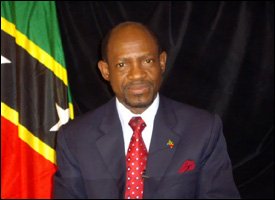
PM Douglas – St. Kitts – Nevis
Photo By Erasmus Williams
Basseterre, St. Kitts – Nevis
June 04, 2011 (CUOPM)
St. Kitts and Nevis Prime Minister and Minister of Finance, Hon. Dr. Denzil L. Douglas (Labour Party) has unveiled a three-fold objective of a new home-grown economic strategy and programme following an announcement by the International Monetary Fund (IMF) of a US$84 million Stand-By Arrangement on Friday.
“Firstly, to create the environment for strong and sustainable growth to occur, secondly, to place debt on a downward trajectory in order to reach a sustainable level of debt and thirdly to maintain the health of the financial system at the same time while we are achieving the first two,” said Prime Minister Douglas in an opening statement at a Joint Press Conference by the St. Kitts and Nevis Ministry of Finance and a visiting IMF Mission Team.
Dr. Douglas told reporters that the global economic and financial crises have brought home very forcefully to the vulnerability of St Kitts and Nevis to external shocks.
“Due mainly to a decrease in tourism receipts and foreign direct investment by roughly 25% each in 2009, GDP is now estimated to have contracted by over 9% in 2009 and by a further 1.5% in 2010. In 2011 and 2012 the economy is forecast to grow by approximately 1.5% per annum,” said Prime Minister Douglas, pointing out that the global recession has severely impacted economic activity in the wider Eastern Caribbean Currency Union (ECCU) region.
He said tourism and Foreign Direct Investment – two of the Federation’s two main pillars of economic growth also deteriorated.
Real regional GDP contracted by about 6.2 percent in 2009, after growing 1.9 percent in 2008.
He recalled that in response to the domestic situation, the Government launched a comprehensive fiscal reform effort.
“In 2009 and 2010, the Government still managed to attain an average primary surplus (overall fiscal balance before interest) of 2.4% of GDP. This is among the highest in the world for non-energy producing countries. Prior to the crisis, the average primary balance was over 4% of GDP per annum,” said Prime Minister Douglas, who also recalled that Value Added Tax (VAT) was introduced in November 2010, the Housing and Social Development Levy was modified, the Unincorporated Business Tax was introduced, the system of fees and taxes for Duty Free stores was adjusted, increments for Civil Servants were frozen, the Electricity Tariff was increased and the corporatization of the Electricity Department has been accelerated.
“These are only some of the measures that have contributed to the enormous fiscal adjustment that was made in order to compensate for the loss in government revenue which resulted from the economic recession,” said Dr. Douglas, disclosing “despite these efforts, the stock of public and publicly guaranteed debt has continued to spiral upwards, in terms of the payment constraints with heavy amortizations scheduled for the years 2011 to 2013 period.”
“Bearing in mind that we do not have access to concessional financing, having been graduated due to our level of per capita income, the Ministry of Finance has concluded that the projected financing gaps are unlikely to be closed through continued fiscal effort alone,” said Dr. Douglas.
He said that in order to share the burden of the debt repayments “we decided that creditors had to be brought on board. As you are aware we are now making preparations to approach creditors in order to determine a new strategy to manage our public debt stock. This new strategy for managing the debt will not include the Treasury Bill portfolio.”
The Prime Minister said it is necessary to continue on the path of fiscal adjustment to arrive at sustainable debt levels and a consolidated fiscal position with the support of regional and international partners “who can provide the appropriate advise, analysis and financial and other resources to ensure that we have the best prospects for success.”
“Therefore having produced a comprehensive economic program and carried it on our own to the point where we would now need support, we invited the IMF to examine our program and determine whether they would be prepared to partner with us as we seek to further elaborate the plan and enter another phase in the process,” said Dr. Douglas.
He said the visiting IMF Team has examined all of the actions that have been taken thus far and the plans for the short to medium term and the Team “has agreed in principle that it is a strategy that it is a programme that they now can support.”
“There is nothing in the new challenge that we face that is not already being pursued by the Government as outlined in the various measures included in the Budgets over the past years,” said Dr. Douglas, who said while he was aware of some of the nervousness that many persons may feel as the Government approaches the IMF “this is a new dispensation; this is our own home-grown programme that the IMF has examined and are willing to partner with us by lending the necessary resources.”
Prime Minister Douglas gave an assurance that the programme “has been well thought out and will rebound to the benefit of our country at this very critical time.”
He said the Government will continue to consult with its stakeholders as far as is possible so that “we can all be assured that we move together as one towards a more prosperous future.”